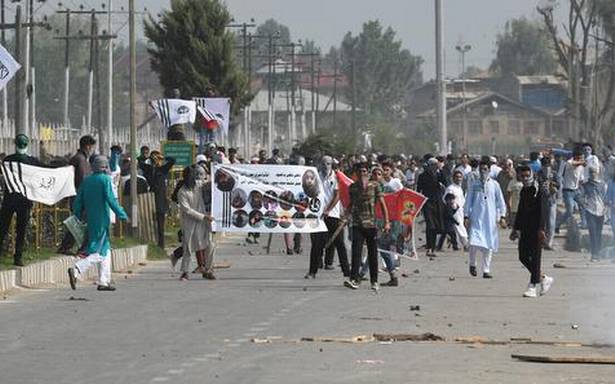Police move likely to impact hundreds of families as Valley saw prolonged cycles of street protests
The J&K police move to deny security clearance to those “involved in crimes prejudicial to the security of the State, including stone-pelting” is likely to impact hundreds of families in Kashmir, where the official list of street protesters swelled significantly between 2008 and 2017 up to around 20,000.
“All the field units of CID SB-Kashmir are hereby directed to ensure that during verification related to passport service and any other verification related to government services, schemes, the subject’s involvement in law and order, stone pelting cases and other crime prejudicial to the security of the State be specifically looked into and same must be corroborated from local police station records,” the fresh order reads.
Digital evidence
It called for collecting digital evidence like the CCTV footage, photographs, videos, audioclips and quadcopter images available in the records of the police, security forces and agencies as references. “Any subject found involved in any such cases must be denied the security clearances.”
Top sources said the list of persons — including lawyers, journalists, politicians, civil society members — with “adverse background reports” is growing longer in the last one year. Many mainstream leaders, even from the National Conference and the Peoples Democratic Party, were denied passport and travel documents.
Former Chief Minister and Peoples Democratic Party (PDP) president Mehbooba Mufti was also denied passport in March after an ‘adverse’ report by the CID. She approached the High Court but the judge observed that “the scope of this Court in the matter of grant or otherwise of passport in favour of an individual is very limited”.
The fresh order is likely to leave hundreds of locals ineligible for passport and jobs in the Valley, which saw major upheavals and prolonged cycles of street protests and civilian killings during the 2008 Amarnath land row, the 2009 Shopian ‘murder’ case, the 2013 hanging of Parliament attack convict Afzal Guru, the 2016 Burhan Wani killing and the protests after the Centre’s move to end J&K’s special status on August 5, 2019.
Amnesty in many cases
According to the official figures, 3,773 cases of law and order were registered in 2016 and 2017 and resulted in the arrest of 11,290 people. Around 9,730 people faced charges between 2008 and 2017 for participating in the protests. Later, the Omar Abdullah and the Mehbooba Mufti governments announced amnesty in many cases.
Official figures suggest that between 2016-17, 2,330 people were arrested in Srinagar, 2,046 in Baramulla, 1,385 in Pulwama, 1,123 in Kupwara, 1,118 in Anantnag, 783 in Budgam, 714 in Ganderbal, 694 in Shopian, 548 in Bandipora, 547 in Kulgam and two in Doda districts during 2016 and 2017. Around 56 government employees were among the 4,949 people found involved in stone-pelting incidents “who were not affiliated to any political party” then.
Over 3,000 persons, including politicians, were officially arrested in the run up to the August 5, 2019 decision.
Source: Read Full Article

